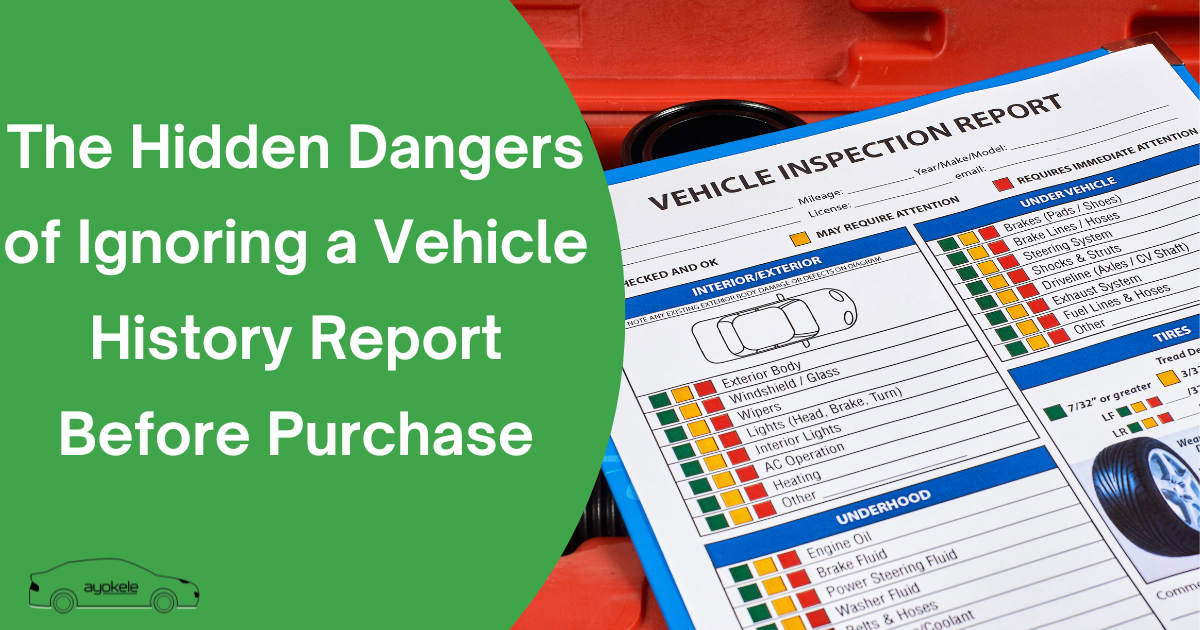The used car market offers compelling value propositions, with vehicles often available at 30-50% below their new counterparts after just a few years of use. However, this potential value comes with significant risks that extend far beyond visible cosmetic issues or obvious mechanical problems.
A comprehensive vehicle history report serves as your primary defense against these hidden dangers, providing critical insights that even thorough physical inspections cannot reveal. Understanding what lurks beneath a vehicle’s seemingly pristine exterior can save you from financial disaster, safety hazards, and legal complications.
What Vehicle History Reports Reveal
A comprehensive vehicle history report compiles data from multiple sources to create a timeline of a vehicle’s past experiences. These reports typically include:
- Accident history, including severity and repair details
- Title status (clean, salvage, rebuilt, flood-damaged)
- Odometer readings throughout ownership to detect tampering
- Service and maintenance records
- Previous ownership details and duration
- Registration history across different locations
- Recall information and compliance
- Lien status and potential financial encumbrances
- Import/export records for foreign vehicles
- Usage history (personal, taxi, rental, police)
In Nigeria, while centralized vehicle history reporting systems are still developing, services like AutoVIN, CarCheck Nigeria, and TransportInfo provide varying levels of vehicle background information. Additionally, the Nigeria Customs Service can verify import status, while the Federal Road Safety Corps (FRSC) maintains registration and accident records that can be accessed through proper channels.
The Financial Pitfalls of Undisclosed History
Perhaps the most immediate danger of purchasing without historical verification is significant financial loss. Vehicles with problematic histories typically experience dramatic value depreciation that may not be reflected in the asking price:
- Salvage Title Devaluation: Vehicles previously declared total losses by insurance companies and rebuilt carry salvage titles, instantly reducing their value by 30-50% compared to clean-title equivalents. Without history verification, buyers frequently pay near-market rates for vehicles worth substantially less, often discovering the truth only when attempting to resell or insure the vehicle.
- Undisclosed Accident Damage: Modern repair techniques can effectively hide significant structural damage. While a vehicle with properly repaired moderate damage might function adequately, its market value remains 15-25% below comparable accident-free vehicles. This value gap represents immediate financial loss when purchasing without historical verification, even when repairs were professionally completed.
- Odometer Fraud Exposure: Odometer tampering remains surprisingly common despite digital systems, with fraudsters using sophisticated electronic tools to roll back displayed mileage. Each 10,000 kilometers fraudulently removed typically adds 5-8% to a vehicle’s perceived value. History reports showing inconsistent mileage progression provide the primary defense against this fraud, which can otherwise cost buyers hundreds of thousands of naira in artificial value.
- Hidden Flood Damage: Flood-damaged vehicles often appear functional initially but typically develop progressive electrical and mechanical problems within 6-18 months of purchase. These vehicles should sell at 60-70% discounts when properly disclosed, reflecting their compromised long-term reliability and inevitable repair needs. Without history verification, buyers pay standard prices for vehicles that will require extensive future repairs while holding minimal resale value.
Safety Concerns Beyond Cosmetics
While financial implications are significant, safety risks represent the most serious consequences of purchasing vehicles with undisclosed histories:
- Compromised Structural Integrity: Vehicles with previous major structural damage may have compromised crash protection even after professional repairs. Modern vehicles incorporate carefully designed crumple zones and load paths that may not function as intended after significant reconstruction. History reports identifying major structural repairs alert buyers to potential safety compromises that visual inspections cannot detect.
- Airbag and Restraint System Issues: Deployed airbags require expensive replacement, leading some unscrupulous sellers to install counterfeit airbags or simply disconnect warning lights without replacing systems. These modifications create catastrophic safety risks during accidents. History reports documenting accidents severe enough to deploy airbags allow buyers to specifically verify proper system restoration before purchase.
- Flood Damage and Critical Systems: Water exposure compromises critical safety systems including anti-lock brakes, stability control, and electronic steering assists. These systems may function intermittently after flood exposure, creating unpredictable safety hazards during emergency maneuvers. Flood indicators in history reports prompt specialized inspections of these otherwise difficult-to-verify systems.
- Recall Compliance Verification: Manufacturers regularly issue safety recalls addressing critical defects, but compliance remains the owner’s responsibility. History reports typically include recall information and sometimes compliance status, identifying vehicles with unaddressed safety issues. This information is particularly valuable for older vehicles where multiple owners may have ignored recall notices.
Legal and Regulatory Complications
Beyond financial and safety concerns, vehicles with problematic histories often create legal complications for unsuspecting buyers:
- Title Washing Exposure: “Title washing” involves moving vehicles between states or countries with different documentation requirements to eliminate salvage or rebuilt designations. While the physical title may appear clean, the vehicle’s legal status remains compromised. When authorities eventually discover these discrepancies, owners face potential confiscation without compensation, regardless of their personal innocence in the scheme.
- Customs and Import Violations: Vehicles imported through irregular channels may lack proper documentation or fail to meet Nigerian import requirements. Owners of these vehicles face potential confiscation during routine traffic stops or registration renewals. History reports identifying import irregularities allow buyers to avoid these vehicles or properly regularize their status before purchase.
- Lien and Financial Encumbrances: Vehicles with outstanding loans or financial claims may be legally repossessed from subsequent owners, regardless of whether they knew about these encumbrances when purchasing. History reports typically identify these financial claims, protecting buyers from purchasing vehicles with unclear ownership status that could be legally seized without compensation.
- Insurance Coverage Challenges: Vehicles with salvage histories, undisclosed modifications, or irregular importation often face insurance restrictions including higher premiums, limited coverage options, or outright rejection. Discovering these limitations after purchase leaves owners with difficult choices between inadequate coverage, excessive premiums, or driving uninsured with significant personal liability exposure.
Red Flags That Necessitate History Verification
While history reports should ideally accompany every used vehicle purchase, certain situations present elevated risks that make verification absolutely essential:
- Prices Significantly Below Market Value: The adage “if it seems too good to be true, it probably is” applies perfectly to vehicle pricing. Substantial discounts without clear justification often indicate hidden problems that sellers hope buyers won’t discover until after purchase. History verification becomes particularly critical when pricing seems unusually attractive.
- Limited or Inconsistent Documentation: Sellers unable to provide complete ownership documentation, service records, or import papers often have reasons for these gaps. History reports can fill these information voids, revealing whether missing documentation reflects simple disorganization or deliberate concealment of problematic events.
- Recent Cosmetic Refurbishment: Fresh paint, new upholstery, or recently replaced carpeting—particularly when not matched by mechanical refurbishment—may indicate attempts to conceal accident or flood damage. History reports help determine whether recent cosmetic work represents routine maintenance or disguised damage repair.
- Mismatched Vehicle Identification Numbers (VINs): Inconsistent VINs across different vehicle components suggest potential theft recovery or assembly from multiple vehicles. History reports tracking VIN-specific events can identify these irregularities and their implications for legal ownership and roadworthiness.
- Reluctance to Permit Independent Inspection: Sellers resistant to professional pre-purchase inspections or history verification often know these processes will reveal problems. This resistance itself represents a significant warning sign warranting thorough investigation before proceeding with any purchase.
Implementing Effective History Verification
Protecting yourself through proper history verification involves several practical steps:
- Obtain the Vehicle Identification Number (VIN) Early: Request the VIN before viewing the vehicle, allowing preliminary history verification before investing time in physical inspection. Sellers reluctant to provide this basic information often have concerning reasons for their hesitation.
- Use Multiple Verification Sources: No single history reporting service captures all potential issues. Combining reports from different providers with direct verification through government agencies provides the most comprehensive protection. In Nigeria, this might include:
- Commercial history report services
- Nigeria Customs Service import verification
- Federal Road Safety Corps registration checks
- Insurance company claim history (with seller’s authorization)
- Manufacturer service records where available
- Verify Physical VIN Matches Documentation: Ensure the VIN physically stamped on the vehicle matches all documentation. Check multiple VIN locations (dashboard, door jamb, engine block) for consistency, as mismatches indicate potential theft recovery or identity tampering.
- Complement History Reports with Professional Inspection: History reports and physical inspections serve complementary purposes. Use history findings to guide inspectors toward potential problem areas requiring special attention, while using inspection results to verify proper repair of issues identified in history reports.
- Consider Import-Specific Verification: For imported vehicles (particularly common in Nigeria), verify proper importation through customs documentation. Vehicles imported through irregular channels often lack proper documentation and may face future regulatory complications regardless of their physical condition.
When History Reports Show Problems
Finding issues in a vehicle’s history doesn’t necessarily mean abandoning the purchase, but it should trigger appropriate responses:
- Adjust Offer Based on Disclosed Issues: Vehicles with documented problems should command significantly lower prices reflecting their compromised value. Use history findings to negotiate appropriate discounts rather than walking away entirely, particularly for issues that affect value more than safety or legality.
- Require Documentation of Proper Repairs: For vehicles with accident history, request documentation showing proper repair by qualified facilities using appropriate parts and procedures. Absence of this documentation suggests potential corner-cutting during repairs that might affect safety and reliability.
- Conduct Specialized Inspections for Specific Concerns: When history reports identify specific issues like previous flood damage or airbag deployment, arrange specialized inspections focusing on these areas. These targeted assessments can determine whether problems were properly addressed or continue to present concerns.
- Verify Insurance Availability Before Purchase: For vehicles with salvage titles or other significant history issues, confirm insurance availability and pricing before purchase. Contact multiple insurers with the specific VIN to understand coverage limitations and cost implications before committing to the vehicle.
- Consider Title Insurance for Legal Protection: In transactions involving expensive vehicles with complex histories, title insurance provides protection against future ownership disputes or undisclosed liens. This specialized insurance, while adding to initial costs, can prevent catastrophic financial loss if legal complications emerge later.
Conclusion
The modest cost of comprehensive vehicle history verification—typically between ₦5,000-15,000 depending on report depth—represents perhaps the highest-value investment in the used vehicle purchasing process. This small expenditure protects against potential losses measuring in hundreds of thousands or even millions of naira while identifying safety concerns that no visual inspection can reveal.
Beyond financial protection, history verification provides peace of mind that the vehicle you’re purchasing won’t present unexpected legal complications or safety hazards to your family. It transforms the inherently risky used vehicle market into a more transparent environment where informed decisions replace hopeful assumptions.




